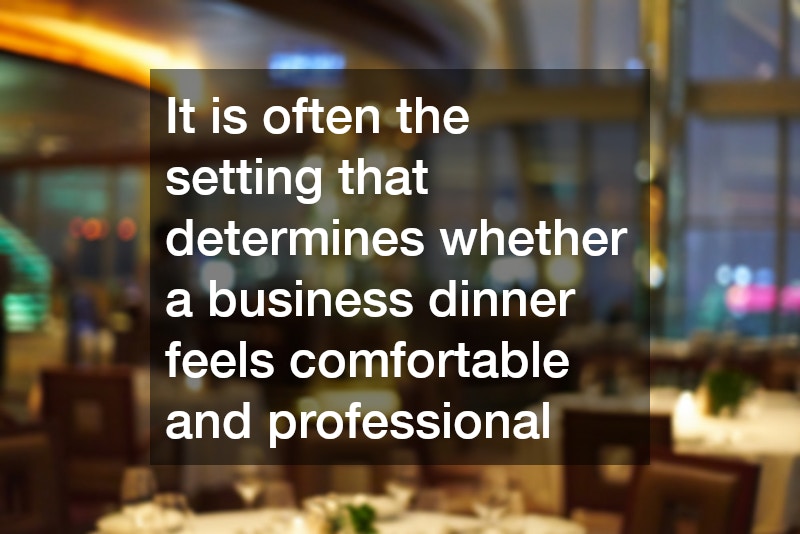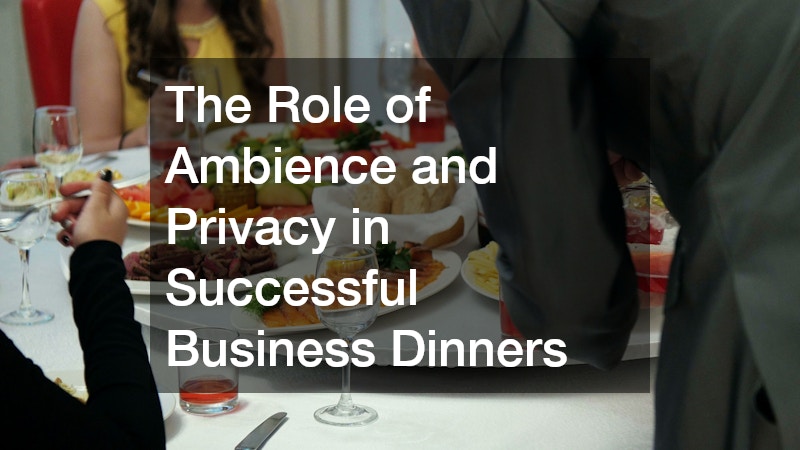Highlights:
-
A restaurant that is popular for business dinners balances ambience, privacy, and professionalism.
-
Ambience influences trust, focus, and the overall success of business conversations.
-
Privacy is essential for confidential discussions and client comfort.
-
Key factors when choosing a venue include noise level, lighting, seating, service, and menu diversity.
-
Restaurants can attract business diners by offering private rooms, discreet service, and business-friendly amenities.
-
Cultural differences affect business dining expectations, making venue choice even more important for international meetings.
Business dinners have long been a cornerstone of professional relationship-building. Whether it’s negotiating a deal, securing a new client, or fostering trust with long-term partners, the setting of a dinner often plays as much of a role as the conversation itself. While the quality of food and service is crucial, two factors consistently stand out in determining whether a business dinner is successful: ambience and privacy.
Choosing a fancy restaurant is not just about impressing clients with upscale dining; it’s about creating the right conditions for open dialogue, comfort, and professionalism. Ambience sets the tone for the evening, while privacy ensures that sensitive discussions can take place without disruption. In this article, we’ll explore how these elements shape the success of business dinners, why they matter to both professionals and restaurants, and practical steps for making the most of them.
Why Business Dinners Matter
Business dinners are more than social events; they are strategic opportunities. Research consistently shows that many deals, partnerships, and long-term business relationships are formed outside the office, often over a meal.
Key reasons business dinners are effective:
-
Trust-building: Sharing a meal creates a more relaxed atmosphere, breaking down barriers that may exist in formal boardroom settings.
-
Cultural tradition: Across industries and cultures, dining together is viewed as a sign of goodwill and hospitality.
-
Better negotiations: Important conversations often flow more smoothly in informal environments where everyone feels at ease.
-
Memorability: A positive dining experience leaves a lasting impression, making clients more likely to remember the host favorably.
This is why professionals often seek out a restaurant that is popular for business dinners—it combines reputation, professionalism, and the right environment to set the stage for success.
Understanding the Power of Ambience

Ambience refers to the overall mood or atmosphere of a dining space. While food quality matters, it is often the setting that determines whether a business dinner feels comfortable and professional.
Key components of ambience in business dining:
-
Lighting: Soft, well-placed lighting encourages a relaxed yet focused environment. Harsh or dim lighting can distract from meaningful conversation.
-
Décor and layout: Upscale interiors convey professionalism, while cluttered or overly casual settings may appear unpolished.
-
Noise levels: Excessive background noise makes it difficult to communicate, while complete silence may feel stiff. The best restaurants balance background music with manageable conversation levels.
-
Service style: Attentive but unobtrusive service enhances the experience without interrupting discussions.
For executives and entrepreneurs, choosing a restaurant ideal for business dinners means prioritizing a venue that reflects their professionalism and complements the purpose of the meeting.
Privacy as a Cornerstone of Professional Dining
Privacy is equally important, particularly when sensitive information or financial discussions are involved. No one wants to negotiate a contract while other diners can overhear every word.
Why privacy matters:
-
Confidentiality: Business dinners often involve discussions of contracts, mergers, or proprietary information that should not be overheard.
-
Focus: Reduced interruptions allow attendees to stay engaged in the conversation.
-
Comfort: Clients feel respected when efforts are made to secure a private, distraction-free setting.
Privacy-enhancing features in restaurants:
-
Semi-private booths or enclosed dining areas.
-
Sound-dampening design elements.
-
Private dining rooms for executive groups.
-
Strategic table placement away from high-traffic areas.
A restaurant that is popular for business dinners typically offers one or more of these features, making it an attractive choice for professionals who value discretion.
How Ambience Influences Business Outcomes
Ambience is not just about aesthetics—it has measurable effects on how a dinner unfolds.
-
Positive ambience encourages trust: A calm, well-designed environment lowers stress levels and makes clients more receptive.
-
Distracting environments derail discussions: Loud, chaotic spaces make it difficult to maintain focus, leading to missed opportunities.
-
Professional settings enhance credibility: Hosting a client in a polished, well-regarded restaurant signals competence and respect.
Consider the difference between inviting a client to a noisy sports bar versus a refined dining room in a restaurant favored for business dinners. In the first case, distractions abound, making it difficult to focus. In the second, every detail—from lighting to seating—supports the flow of conversation, increasing the likelihood of a positive outcome.
Practical Tips for Choosing the Right Restaurant
Selecting the right restaurant is a strategic decision. Here are key factors professionals should consider when planning a business dinner.
Checklist for selecting a restaurant popular with business professionals:
-
Noise level: Ensure the venue has manageable acoustics for conversation.
-
Lighting: Balanced lighting that avoids glare or gloom.
-
Seating flexibility: Options for private rooms, booths, or tables set apart from heavy traffic.
-
Menu diversity: Offerings that accommodate different dietary preferences, including vegetarian, vegan, and gluten-free options.
-
Service quality: Staff who are discreet, professional, and responsive without being intrusive.
-
Reputation: A restaurant that is known within the business community for professionalism and consistency.
Pro tips:
-
Visit the restaurant in advance to assess the environment.
-
Reserve early, especially if a private room is needed.
-
Communicate specific needs (quiet area, dietary restrictions) when booking.
-
Research reviews focused on business dining experiences, not just casual dining.
By taking these steps, professionals can ensure they choose a restaurant that is popular for business dinners and well-suited to their meeting objectives.
For Restaurants: How to Attract Business Diners
From the restaurant’s perspective, becoming a destination for business dinners is a lucrative opportunity. Corporate clients often book regularly, bring groups, and expect high standards of service.
Strategies for restaurants:
-
Design spaces for privacy: Incorporate private dining rooms or quiet sections that appeal to executives.
-
Train staff for discretion: Servers should be skilled at attentive but non-intrusive service.
-
Offer a business-friendly menu: Balanced selections that are refined but not overly complex to eat during conversation.
-
Highlight amenities: High-speed Wi-Fi, easy reservation systems, and reliable service matter.
-
Market strategically: Promote the venue as a restaurant ideal for business dinners through partnerships with local businesses and professional associations.
By positioning themselves as a restaurant favored by executives, establishments can build a strong reputation in the corporate community.
Cultural Considerations in Ambience and Privacy
Cultural norms play a significant role in how business dinners unfold. A restaurant that is popular for business dinners in one country may not align with expectations elsewhere.
-
Western settings: Often emphasize privacy, formal service, and a professional tone.
-
Asian settings: Business dinners may involve larger groups, communal dishes, and an emphasis on hospitality.
-
European settings: Long, leisurely meals are common, with ambience playing a central role in creating an enjoyable experience.
Professionals hosting international clients should consider cultural preferences when selecting a restaurant. A venue that respects these differences demonstrates cultural awareness and enhances relationship-building.
Closing Thoughts
Ambience and privacy are not secondary considerations; they are strategic tools that influence the success of business dinners. The right atmosphere fosters trust, facilitates open conversation, and leaves a lasting positive impression. Privacy ensures that sensitive discussions remain confidential and that clients feel respected.
For professionals, the takeaway is clear: choose a restaurant that is popular for business dinners, one that prioritizes atmosphere and discretion, and tailor the choice to both the purpose of the meeting and the cultural background of the client. For restaurants, investing in business-friendly design and service can build a loyal customer base of corporate clients.
In the end, successful business dinners are about more than food. They are about creating an environment where trust, professionalism, and opportunity can flourish.






